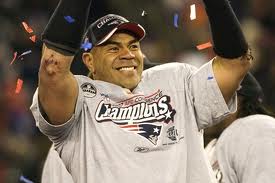Junior Seau found dead at 43
Junior Seau’s apparent suicide stunned an entire city and saddened former teammates who recalled the former NFL star’s ferocious tackles and habit of calling everybody around him “Buddy.”
It also left everyone wondering what led to Seau’s death Wednesday morning in what police said appeared to be a suicide. He was 43.
“I’m sorry to say, Superman is dead” – said Shawn Mitchell, a chaplain for the San Diego Chargers. “All of us can appear to be super, but all of us need to reach out and find support when we’re hurting.”
Police Chief Frank McCoy said Seau’s girlfriend reported finding him unconscious with a gunshot wound to the chest and lifesaving efforts were unsuccessful. A gun was found near him – McCoy said. Police said no suicide note was found and they didn’t immediately know who the gun was registered to.
Neither Mitchell nor Seau’s ex-wife knew what might have led to the former first-pumping, emotional leader of his hometown San Diego Chargers to kill himself.
“We have no clues whatsoever” – Gina Seau said. “We’re as stunned and shocked as anyone else. We’re horribly saddened. We miss him and we’ll always love him.”
The smile. Who ever will forget Junior Seau’s magnetic, coast-to-coast smile?
Or his greatest passions in life: football, family, the disenfranchised.
Shock, dismay and unremitting grief descended upon family, friends, former colleagues and NFL fans at the notion that Tiaina Baul Seau Jr. suddenly had vanished from their lives, quicker than a lightning bolt.
Police in Oceanside, Calif., confirmed that the former San Diego Chargers superstar linebacker (one of the most highly regarded, beloved players in NFL history) was found dead Wednesday at his home from a gunshot wound, apparently self-inflicted, police say. He was 43.
If it was a suicide, no one seemed to know what might have precipitated such a final act of desperation. Those who spent time with Seau recently said he did not act depressed. If he was deeply troubled, Seau concealed his private misery to most, even to family members who desperately sought answers to confounding questions.
“I don’t understand who (did) this to my son” – said his distraught mother, Luisa, who wept outside his home as she was comforted by well-wishers. “I pray to God — take me, not my son. … Monday, Tuesday (he was) talking to me, joking. Junior, why you never tell me?”
Many of those close to Seau (pronounced SAY-ow) groped for answers for his sudden, mysterious demise. Seau was discovered wounded and unconscious in his home, just north of San Diego, by his girlfriend, but no suicide note was found, police said.
As word of Seau’s death spread, fans began assembling at Seau’s The Restaurant, an eatery and sports bar in Mission Valley that he founded during his playing days. The restaurant was supposed to open for lunch at 11 a.m. But a computer-generated “Closed” sign was placed on the front door by an employee. Some people left flowers; others stood in disbelief.
“What he meant to me was that if you do something with all your heart, you can be successful” – said Lido Ortuno, 38, wearing a No. 55 Chargers jersey in Seau’s honor. “He played the game the way it was played in the ’50s and ’60s. He didn’t care about his body; he just wanted to win.”
The death of legendary linebacker Junior Seau, as sad as it is for many, is nothing new for the remaining members of the 1994 San Diego Chargers.
Seau, who was found dead Wednesday of an apparent suicide, is now the eighth player of that team to die.
The 1994 Chargers (a group of gritty overachievers) are the only edition of the team to make the Super Bowl. But instead of that feat being the team’s legacy, many are wondering about the string of freakish deaths that have haunted the AFC championship team.
“Not again” – former Chargers running back Natrone Means told the San Diego Union-Tribune after one of the deaths in 2008. “It’s crazy, just crazy, that we’ve had so many guys who have fallen. I can’t make any sense of it. I’ve given up trying. You just hope you quit getting these random messages out of nowhere that another teammate has passed away.”
* In 1995, about five months after the Chargers lost to the San Francisco 49ers in the Super Bowl, linebacker David Griggs died in a car crash. He was 28.
* In May 1996, running back Rodney Culver died in a plane crash. He was 26.
* In July 1998, linebacker Doug Miller died after being struck by lightning while camping. He was 28.
* In May 2008, center Curtis Whitley was found dead of a drug overdose. He was 39.
* In October 2008, defensive end Chris Mims died of complications from an enlarged heart. He was 38.
* In February 2011, defensive tackle Shawn Lee died of a heart attack. He was 44.
* In December, linebacker Lew Bush died of a heart attack. He was 42.
Then Wednesday tragedy hit that team and the NFL community again when Seau was found dead in a bedroom of his Oceanside, California, home. A handgun was found near his body. He was 43.
